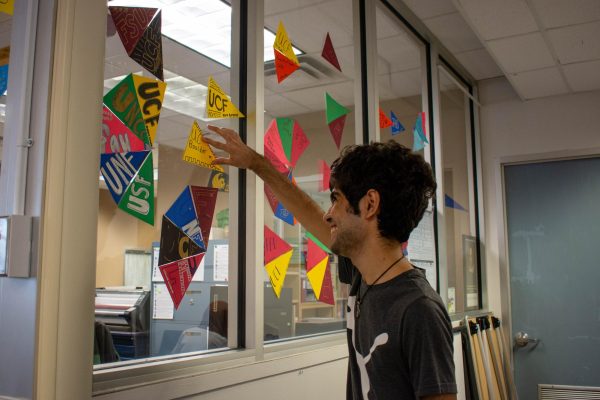Get to know the district five school board representative candidates
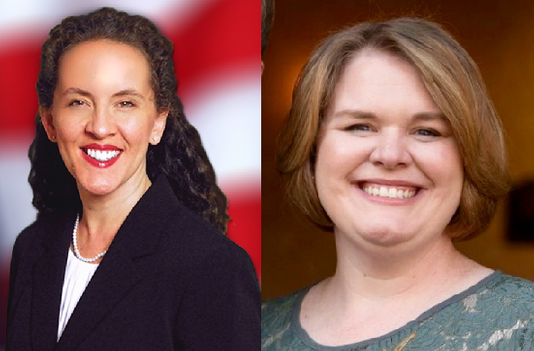
Kayte Campbell (left) and Kelly Damerow (right) are running for District five school board representative.
November 5, 2018
Kelly Damerow is a 33-year-old stay-at-home mom with a baby and attended the University of Florida, acquiring her Bachelor’s and Master’s in Elementary Education and a Law Degree with Family Law Certification. Damerow has lived in Brevard from 2007 to 2011 then moved back in 2014. She has worked as a Federal nonprofit advocate, chair of the state political action committee of the Junior League of South Brevard and advisory board member of the Children’s Hunger Project.
Your opponent Katye has expressed the belief that parents should be the main decision-makers in education. What are your thoughts on a parent’s role in education along with how that should be weighed with student and teacher input?
You have to respect the parent-child relationship. You got to respect parents’ rights to make decisions for their children – especially when they’re under 18 – but I think there’s always gonna be a place to get the student’s voice and it’s important to give them an opportunity to be heard.
Our science department was recently in a tough spot when they were unable to afford updated honors and AP textbooks with the money provided by the school board. The response from the district was to claim that the lack of funding could be countered with increasing online resources. How would you have approached funding advanced academic resources?
There are some definite benefits when it comes to online and digital resources. It’s a lot easier to make updates and changes or corrections if errors are found. It’s a lot easier to carry home than I remember my AP textbooks were. We had textbooks that were broken – you know, put through the wringer – just through their normal wear and tear. You have to balance that with making sure that [online education] is presented in a way that is powerful to the students. This would be somewhere that it would be great to get student input. It doesn’t seem to be as much of a hindrance or as much of a jump as it used to be.
With increased investment into STEM programs, some members of the community are concerned that our local arts education is suffering as a result. What would you do to combat these concerns?
It’s important that while we have focused on different areas, we’re still offering comprehensive educational programs. With the amount of tech and engineering jobs that we have here, having a science and technology and engineering math focus makes a lot of sense as long as that focus isn’t told completely from the concept of creating well-rounded individuals and well-rounded citizens and giving students the opportunity to pursue areas that are their passions because not every student is going to go into tech engineering or math fields.
What will you do to improve teacher pay?
I think we need to start with making sure teachers get cost-of-living increases a budgetary priority, something that happens first, and then if we don’t have money for special projects then we can’t do all of our special projects. I think we also need to have stronger efficacy to our Florida Legislature. The amount of funding they give for teacher salaries is less and less every year and there’s almost no wiggle room.
Your opponent is strongly in favor of arming staff and increasing security measures on campus, which is a strongly debated topic in our county. What measures do you support regarding school security? Is there a line at which you believe security becomes too restrictive?
I think there was definitely a knee-jerk reaction after Parkland because that does hit so really close, and a lot of these plans for hardening schools […] had to be sped up and to do that a lot of funds got shifted away from other educational areas. Personally, I believe that SROs are the best security measure as opposed to the Guardian program. I think [the SROs] can do a lot more in school than just provide security if the worst happens. They can be a resource to you guys. In elementary school, sometimes they’re the first member of the law enforcement that a student’s ever met and they’re part of a community policing force. One of the top complaints I’ve heard about this is that it’s gonna take a while to get our school resource officers recruited, trained up, and in the classroom. I think that that’s not necessarily a bad thing. I think this is important work that we need to keep pushing forward on. We need to make sure that we’re thinking with clear heads that were making research and evidence-based decisions.
What plan would you introduce to help schools pay for [security] resources?
Even the Governor started asking the legislature to release about 67 million in funds that they set aside to help counties [institute the Guardian program] and allow the counties to use that to pay SROs and I think that’s a that’s a no-brainer decision – oh there’s the funds right there. It’s gonna be up to the voters if they want to renew [the half-cent sales tax] in 2020, but it’s gonna be up to those [in the school system] to share with the voters incidences like the danger behind air conditioners not working in August in Florida and the danger that puts students and teachers in. I’m always in favor of letting the public weigh in, particularly at the ballot boxes.
Given the difficulties being faced with [implementing] the new FOCUS system, how would you improve the process of substitution?
When you’re switching systems like that, there’s always gonna be hiccups but my husband, a software engineer, [would] probably say [to test] as much as possible before they go into action. This is something whereas a school board member I would look into how much testing was done, making sure the companies that we contract with to do these kinds of things [aren’t just] the lowest hitter, but those who have a good reputation of that implementation.
What steps would you take to improve district communication?
It’s funny how many important school issues I hear about for the first time on the school board agenda or from a parent. I think that the school district communications office needs to [not just cover] feel-good stories. We’ve got social media, we all use it as a way for regular communication so that parents, students, teachers, anyone who’s really cared about local education can feel updated, informed about what’s going on because I know there are concerns about how the local journalism might be covering them, but that right now might be the only source to get information. Or worse, word-of-mouth through Facebook. There’s no way to verify it, there’s no way to go back to it and say, “Oh here’s what our public schools had to say about that issue to clear it up.” They just need to make sure there’s more communication happening there and that it’s not only internal but also to the public.
How would you encourage enrollment in advanced programs [such as those of choice schools and technological education?
You can only have so many facilities up and down the county, so they brought back the busing […] so that’s going to be an assistance there. But there’s a large cultural shift that needs to happen. The one who goes through any technical education programs and becomes a contractor or electrician or an HVAC specialist- they’re gonna be buying a house sooner than some of their friends who are going to college because they won’t have to worry about student loans. You’re gonna have a job that pays fifty thousand dollars right out of high school and that’s gonna lead them to a wonderfully happy life and the ability to support a family and be a part of the local economy- but to support those programs I think changing the culture, the way we talk about it, and then also making sure we’re getting high-quality teachers for those programs- because it’s hard when someone’s doing really well in their trade profession. They don’t want to necessarily leave that to take a pay cut. So we’re gonna have to give them a compelling reason to come back into the classroom and work with the next generation.
Damrow’s opponent, Kayte Campbell, is a 43-year-old substitute teacher who attended Oklahoma Baptist University receiving a Bachelor’s in Music Education. Campbell has three kids, aged 9, 12 and 14 and has lived in Brevard since 2007. Campbell has worked as a crisis pregnancy center donor coordinator, BPS A+ volunteer and a member of the BPS music instructional materials adoption committee.
You’ve stated that “Parents should also maintain the right to approve or disapprove any sex education, health services, or counseling that might conflict with their family’s values.” What would your response be to a situation in which a student’s personal beliefs conflict with their parent’s?
Until [my daughter’s] 18, I have the responsibility- not just the right- for molding her education, for molding her mind, her spirit, her mental and emotional state. That’s my responsibility. It does not belong to the state, which is what the school district represents. Even knowing that some parents aren’t always awesome parents, sometimes there’s a lot of conflict going on, but as a parent that’s your responsibility [and], it’s also your responsibility to communicate with your student. I know my child better than anybody else and I know what’s better for them- if the charter school would be better, if a choice program would be better, if homeschooling would be better- that’s my decision and I think that needs to be maintained. Every student has a different way of learning and my three students- my three children- they all learn differently, have different personalities. As a mama, I will tell you I still maintain that control until they turn 18 and honestly in my house it’s going to be until they’re out there paying rent and paying for their insurance and […] having a job and making their own decisions. We’re having this emphasis on the mental-social health and [people are saying], “Let’s put these social workers, let’s put these psychologists in there.” But I will tell you as a person of faith and a person of a certain set of laurels, [that] my concern is that I want to see written out very specifically to know what is this gonna look like. My children can’t even have scoliosis or eye tests without me signing a paper, […] so why would I allow them to come in and give my child psychological advice without my signing off on it. If [my daughter] goes to a counselor, there are some things that they [would] keep between them so that my daughter will open up to the counselor that they don’t have to tell me, but the truth is […] if I ask as a parent to a private counselor, [they] have to tell me what she said because that is my right, my responsibility as parent. The other scary thing that I could foresee […] is there could come a situation where a school psychologist comes in and does a counseling situation and they come back to the parents say, “I think your child needs to have this diagnosis and you need to put them on this kind of medication.” I don’t like that. The parents and the school [should be] working together in the best interest of the child but I don’t ever want us to be in a situation where the school can [go around] the parents and be able to force something.
Our science department was recently in a tough spot when they were unable to afford updated honors and AP textbooks with the money provided by the school board. The response from the district was to claim that the lack of funding could be countered with increasing online resources. How would you have approached funding advanced academic resources?
I have already talked to a science teacher down at Heritage who [didn’t get all the textbooks needed for her upper-level classes]. They got one per classroom, [which] only gives them one online license. She was complaining [because] evidently all the other schools knew and so kept their old textbooks. They didn’t know that, so they threw them all away and [all] she had was an old set of chemistry textbooks that she held onto. That’s very frustrating as a taxpayer because we put all this money in the school, and the textbooks are supposed to be bought and you’re telling me you didn’t buy everything that we’re paying you for. We have teachers who won’t use the textbooks and they’re sitting on the shelves and that’s a waste of money. It’s a waste of my money, it’s a waste of your parents’ money. Let’s buy what’s actually going to be used.
With increased investment into STEM programs, some members of the community are concerned that our local arts education is suffering as a result? What would you do to combat these concerns?
As a music teacher, I always saw this research about how music and the arts benefit the brain. I think this is true of the career technology programs, as well the arts, that it creates an interest level for students to be in school. [If] students have an interest something that motivates them to be in school, they’re gonna have better attendance they’re gonna have better grades, because if you don’t keep your grades up you’re not gonna be able to perform at the contest, with the concert, or the basketball game, or whatever it is that keeps students in school. If someone feels like they belong to a group, school becomes more than just this thing that [you] go to. If it comes down to it and we’ve got to cut stuff, those are the arguments that I’m going to make. You can’t cut things that keep students motivated to stay in school.
What will you do to improve teacher pay?
When [the board] comes to the budgeting time they do everything else first and they say, “Okay, let’s give [what’s left over to the] teachers.” The priority […] until we are at least competitive with the counties that surround us needs to be the teacher salary. If the teachers all go into other careers, we’re gonna be in bad shape. I called every district and said, “Okay, I’m a teacher with seven years of experience, what would my starting salary be?” Brevard was the lowest by far. When teachers go into this business, they know they’re not in it to get rich they know they’re not gonna get overtime, they know they’re gonna have long and sometimes thankless hours, but we have got to get to a point where they’re […] at least not wanting to run off to other counties. I’ve never been involved in politics besides voting. Education isn’t a Democrat or a Republican thing- it is a state thing, it is a family thing, it’s family values.
You have announced that you are in favor of arming teachers and increasing security measures on campus, which is a strongly debated topic in our county. Is there a line at which you believe security becomes too restrictive?
I have talked to people who know the sheriff and other law enforcement officers and do some research. Metal detectors I don’t think are a good idea. For example, at Central […] they cannot be on campus until 9:00 and the bell [doesn’t ring until] 9:25. So [putting 1200 students] through metal detectors in 25 minutes- that is a nightmare. Plus if something were to happen and a shooter were to come along, [there would be] 1200 students waiting to get in the door going through metal detectors. Another thing that somebody brought up to me was let’s say there’s a ball game- no metal detectors and all that stuff going on- somebody comes in stashes something in a locker room. A lot of people don’t like the Marshall program […] it’s very controversial. I have done more research and lost more sleep over that one issue than anything. I do not take it lightly. I have come across lots of misinformation [such as] that we’re talking about arming teachers- and we’re not. We are talking about arming staff. I don’t own a gun, I’ve never shot a gun in my life, I am NOT a member of the NRA. That’s it’s not what it’s not about. To have people on campus who are armed [would be] a “break glass in case of emergency” measure. This is not an issue I’m gonna die on, but I want to make sure that the right information is out there. Some school districts all the way back to 2007 [have had this program] and there’s never been a single incident of a person accidentally been shot by a marshal in eleven years. I don’t like politics to make my decisions. I like research to make my decisions. When I look at the facts, I’m comfortable with it […] as a parent.
What plan would you introduce to help schools pay for [security] resources?
The state […] gave some funding towards SROs, but it wasn’t enough to put every an SRO in every school. They [also gave money] for the Guardian program which was more than enough. The state ties your hands [on a lot of] things. The half-cent sales tax is one of the things that we can use for security because it was already designated that way. By law, you can only use the half-cent sales tax for exactly what we said it was going to be used for. It’s kind of like a family budget. You have to [make a crisis a priority], but you can’t drop everything else. You can’t stop paying for food and you can’t stop paying for supplies and things like that. The financial part of it is a big sandwich […] and I’m just starting in on the crust. It’s my understanding they’re going to continue […] building security.
Given the difficulties being faced with [implementing] the new FOCUS system, how would you improve the process of substitution?
I know one thing that was frustrating for the teachers that I’ve talked to is that they knew it was coming […] the teachers didn’t have the training in the time when they should have had it, which is before the school year ever started. Let’s say you have a brand new teacher that came into the district and they had to learn Edline because they had to put grades in it for nine weeks. That’s not effective time management. I’ll be honest: I went to three open houses because I have three kids in three different schools and every single one of them said, “We have this thing called FOCUS and it’s going to start but we don’t really know.” [When schools communicate] to the parents [that they don’t know] what’s going on, that doesn’t instill a lot of confidence in the community. If we get to the point where we can’t do something with confidence I think we need to just […] not do it.
What steps would you take to improve district communication?
Communication is super important in any organization and I will tell you that I think our district- whether it’s been as a parent or whether it’s been as an employee, as a substitute, or even in this race- the communication is just something that’s a culture. I think just making sure that- whatever decisions are made- we let the community know in ways that are effective. Our school district has a YouTube channel and if you’ve ever watched any of [their videos] you know how many people usually [watch them]. It’ll have like 63 views in a district with 73,000. That’s not an effective communication tool. I got an email from one of my children’s school last week that said, “Well we may not be able to do emails in the future so we’re getting all this information out while we can.” I’m like, “Oh you’re fixing to tell me that I’m not gonna get any more information from my school?” These are things we kind of need to know before we go into it. We have to have a plan in place if Edline goes away. I think that in whatever policies and decisions are made, an important thing is going to be how we’re going to [tell] the community what’s going on. If you don’t read the school the district newsletter that goes out- and I’m one of the parents who skims through it- how much of the community really knows [that they’re] using social media, [they’re] using email. If you’re just putting stuff on an hour and a half long videos on YouTube, nobody’s going to watch. Honestly, it’s not an active use of my money as a taxpayer, it’s not an effective use of money that could be diverted into things that would help you guys in the classroom.
How would you encourage enrollment in advanced programs [such as those of choice schools and technological education?
I have a problem with [some career and technical education programs] because you’re saying that in the eighth grade you need to decide what you’re going to do for the rest of your life. Some of you who are college-bound could benefit from Career and Technology education for a couple of reasons: One, if you go to college and you don’t have a full-ride you’re going to graduate with a boatload of debt. What if you took some Career and Technology classes and had a certification where in your summers and your breaks you could work as a bricklayer or an electrician’s apprentice and make good money so that you can help pay for your own school and graduate with less debt? That would be fantastic. I hear all the time [on the radio] about people saying, “I’ve got $40,000, $100,000, $200,000 worth of debt.” That’s more than my mortgage and that’s just their student loans. Rather than segmenting […], let’s have some of this curriculum available to all students. Let’s not make eighth graders make that decision at that age where […] they can’t even decide what they’re going to eat for lunch. I think it’s very practical for people to graduate from high school with the expectation that you’re going to get a job, you’re going to support, you’re not going to be like the Millennials […] who are sitting around expecting everything to be handed to them. You’re gonna graduate with the idea of [being] a productive member of society and I think that’s what’s helpful. One of the things I found as an eighth-grade parent last year, is that there are a lot of parents […] and students who didn’t know things were going on.

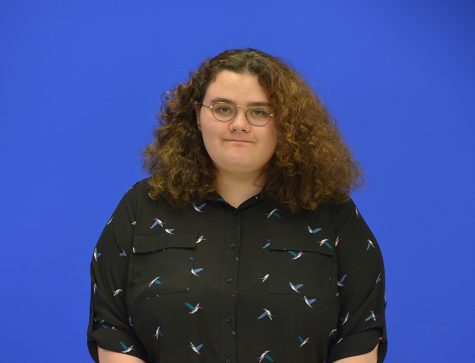


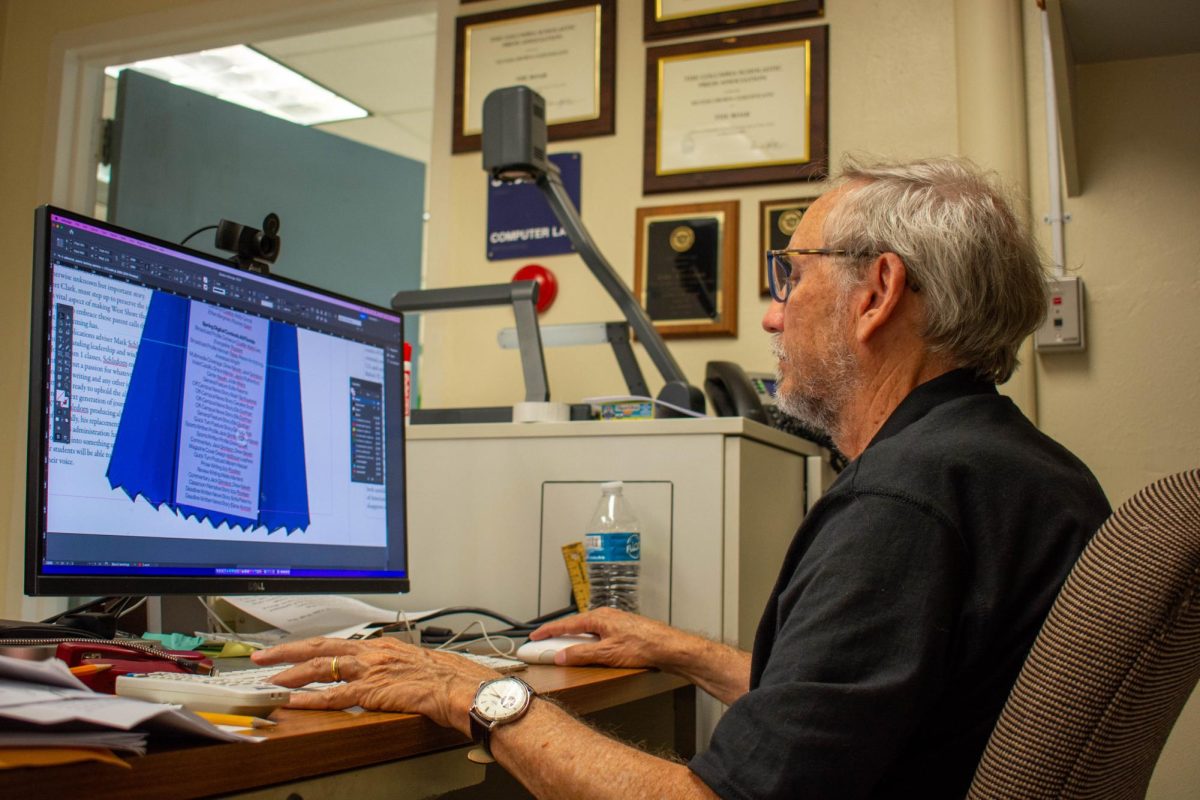
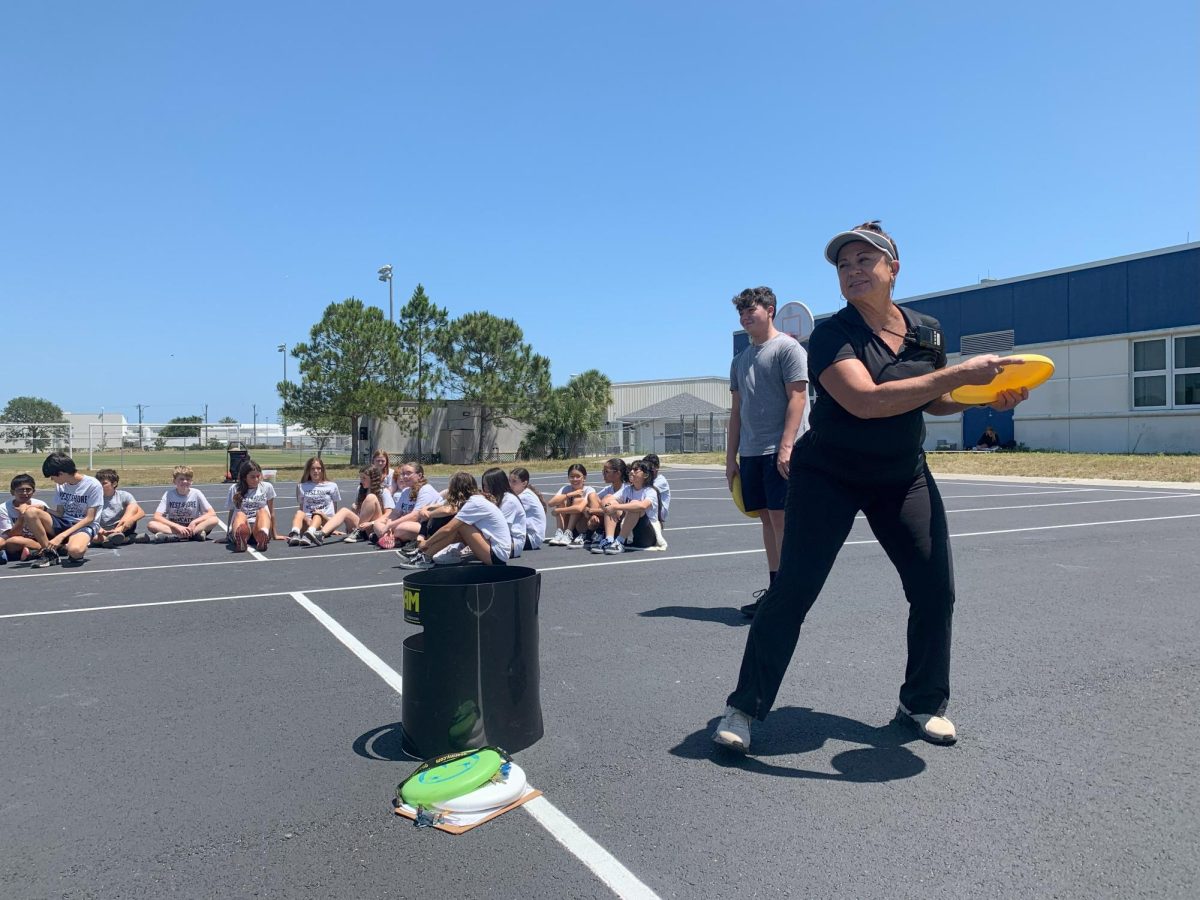
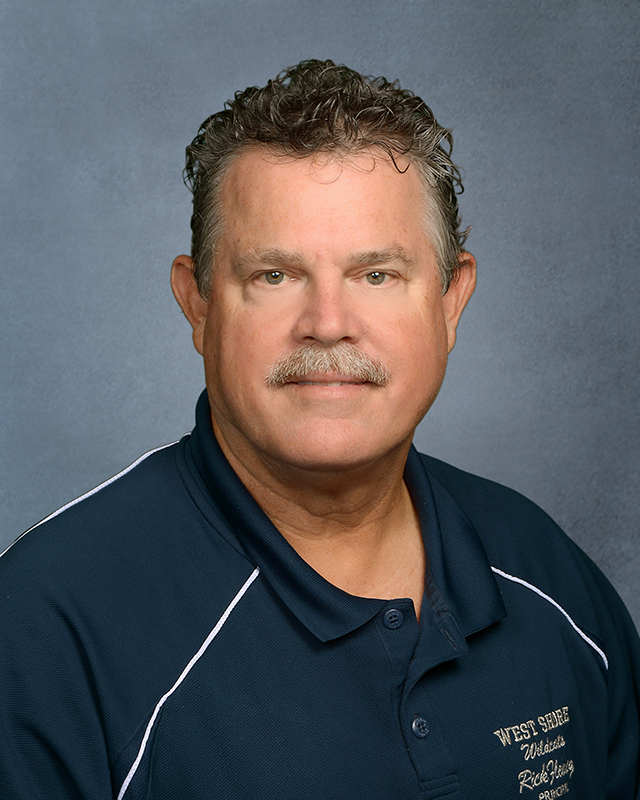
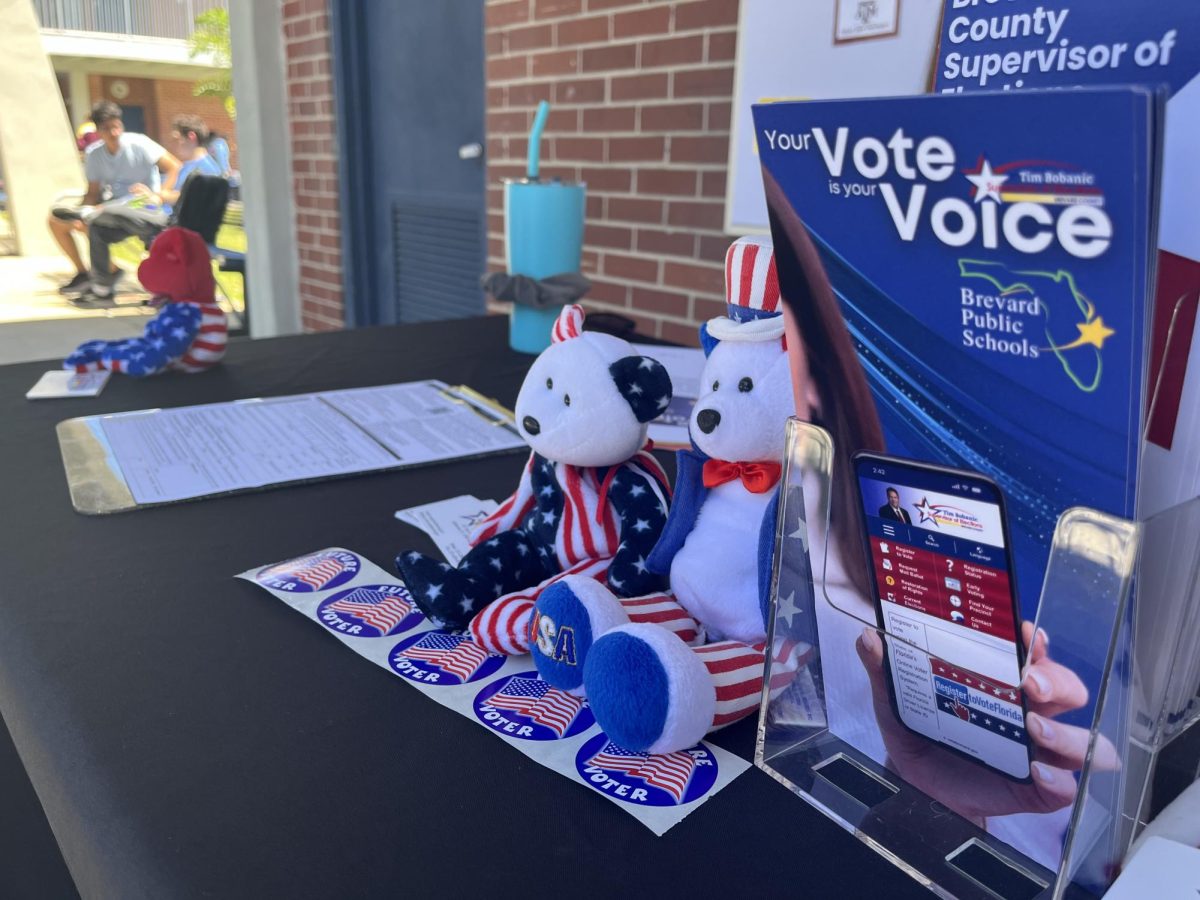


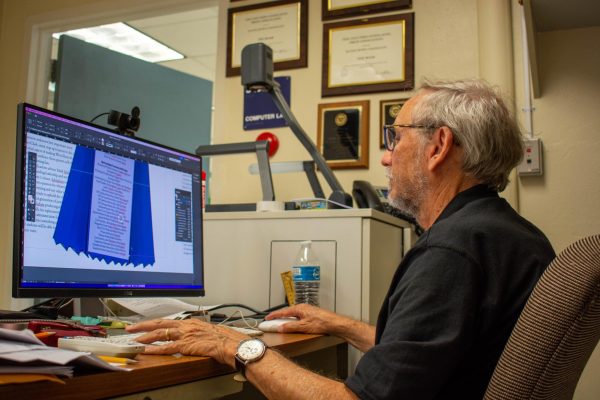
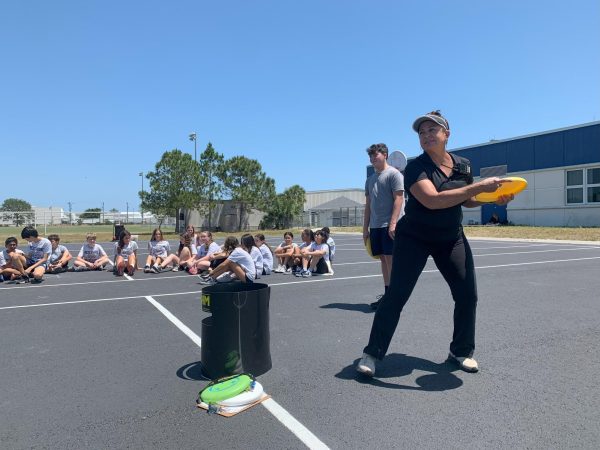
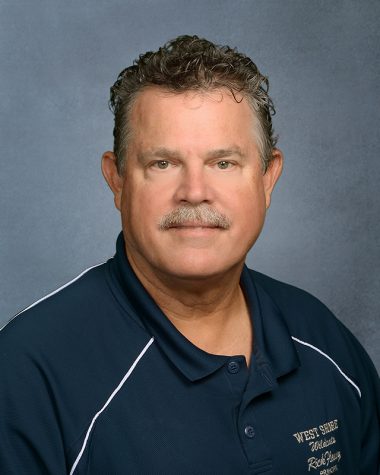
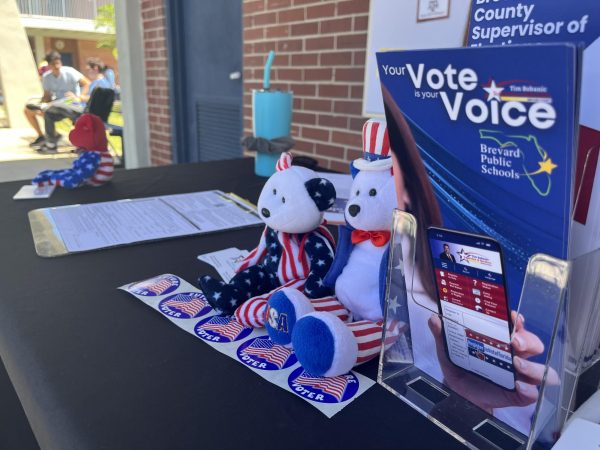
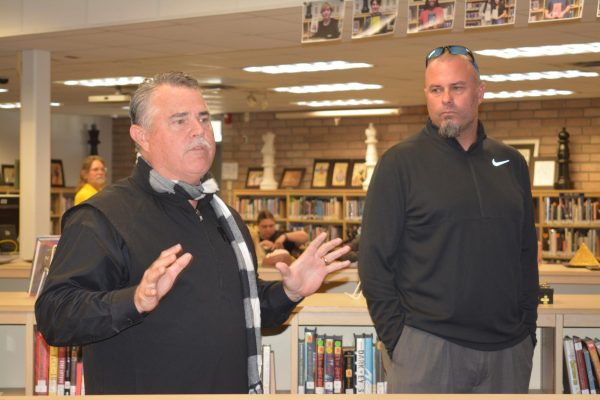
![The Melbourne Fire Department recognized coach and custodian Derrick Hamilton on April 16 with the Lifesaving Citizen Award during lunch. I would just react for anyone, Hamilton said. My love for children -- thats what it comes down to. [I am] where I am supposed to be.](https://westshoreroar.com/wp-content/uploads/2024/04/DSC_0639-1-e1713376507113-600x402.jpg)

